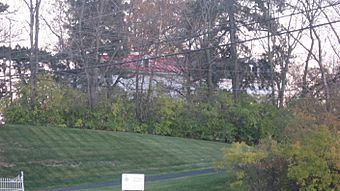Becker House facts for kids
Quick facts for kids |
|
|
Becker House
|
|

View through the trees
|
|
| Location | 179 W. Crescentville Rd., Springdale, Ohio |
|---|---|
| Area | 3.6 acres (1.5 ha) |
| Built | 1830 |
| Architect | Joseph Hough |
| NRHP reference No. | 74001522 |
| Added to NRHP | July 18, 1974 |
The Becker House is a historic home located near Springdale, Ohio, in the United States. It was built in 1830 as a farmhouse. For a time, it was home to a person who played a big part in the national discussions about slavery. The house still looks much like it did when it was first built. Because of its history, it is now a special historic site.
Contents
The Becker House: A Glimpse into History
Building a Farmhouse in 1830
In 1830, a man named Joseph Hough decided to build a house on his large 63-acre property. The house he built was a typical farmhouse for that time and area. It was a simple two-story building. Its outside walls were made of wood planks called weatherboard.
The front of the house has three sections, called bays. A porch covers the entire first floor, offering a nice place to sit. Joseph Hough owned this property until he passed away in the early 1850s.
A Judge's Important Stand
After Joseph Hough's death, the property was sold to John Burgoyne, Jr. His father, John Burgoyne, Sr., lived in the house from 1860 to 1864. John Burgoyne, Sr. became very well known during this time.
He was a judge for Hamilton County, Ohio. During a court case that everyone was watching, he made a very important decision. He ruled that a law called the Fugitive Slave Act of 1850 was not fair. This law made it harder for enslaved people to find freedom. His ruling was a big moment in the national discussion about slavery.
Becoming a National Landmark
In 1974, the Becker House was added to the National Register of Historic Places. This means it is recognized as an important historic site in the country. It was chosen because of its old and well-preserved architecture.
The Becker House is the only historic site in Springdale that has this special national recognition. It was seen as a great example of a mid-1800s farmhouse. Its good condition meant it would likely stay intact for many years.



